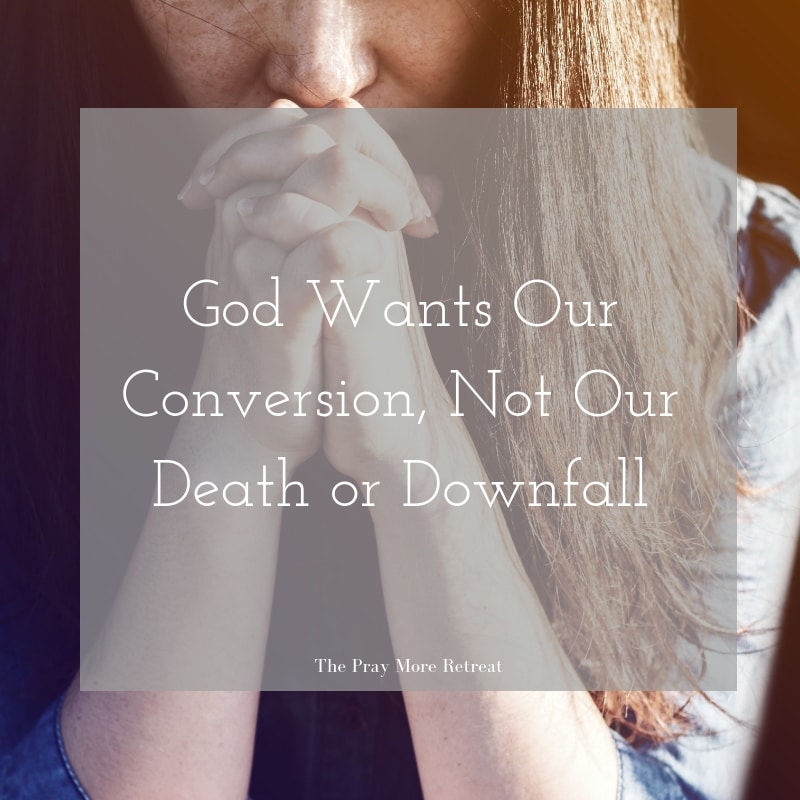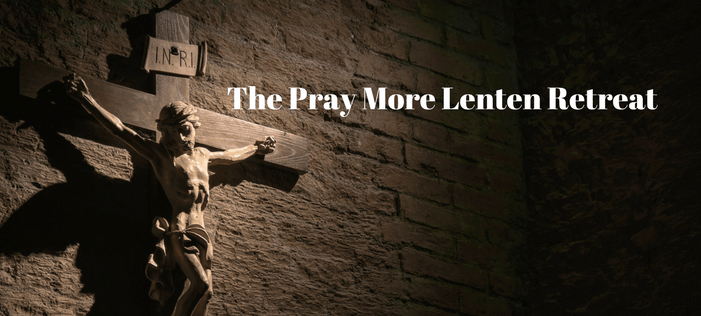Summary
In this talk, Tim Glemkowski discusses how we sometimes tend to be shameful for our woundedness that can cause us to stray from the Lord. He gives examples from the scriptures on how we can convert and be genuinely open to God about our sins to be able to fully encounter a life with Him.
Thank you for watching and participating in this retreat!
Not Registered, yet? Don’t miss the rest of the talks! Register for the Pray More Retreat!
Downloads
Audio MP3
Click here to download audio file.
Printable Study Guide PDF
Click here to download the printable study guide.
Printable Transcript PDF
Click here to download transcript of the video presentation.
“I have not come to call the righteous to repentance but sinners.”
Luke 6:32
Reflective Study Guide Questions
- Have you tried to make sure that people don’t see your brokenness or sinfulness? Have you ever tried to put on a facade in order to not show others that you are suffering, struggling or spiritually wounded? If so, why?
- Tim spoke about sinful people like Zacchaeus, the woman at the well and Levi. Each of them had an experience where they, in Tim’s words, “run towards Jesus”. They are compelled to go to him despite their sins. Is there an occasion in your life where you have, “run toward” Jesus despite sins that were weighing you down?
- On the other hand, have you ever stayed away from God or prayer when you’ve fallen into sin? If so, why was that?
- Sometimes, it’s easy to struggle to repent because we are so afraid of showing God our sinfulness. When we look at our sin we are tempted to despair. Do not despair, this Lent, take time to do a good confession because God doesn’t want you to despair, He wants your conversion and your trust in Him.
Text: God Wants Our Conversion
Opening Prayer
Let’s start again with a prayer. In the name of the Father, and of the Son, and of the Holy Spirit. Amen. Teach us Your way, O Lord, that we might walk in Your truth, that we might know Your peace and Your love, and that we might experience life to the full to which You have called us. Amen. In the name of the Father, and of the Son, and of the Holy Spirit. Amen.
A Problem With Sin
I think that we as Catholics have a problem with sin. Let me explain what I mean by that. Aristotle the philosopher, right, says that the virtue for everything is found in the golden mean. So virtue exists as a mean between 2 extremes. So, like, think of the virtue of courage exists, you know, in the golden mean between foolhardiness and cowardice, right. It’s somewhere in-between those 2 things. It’s neither of them, but it’s kind of right in the middle, right in the sweet spot, right. And I think the same is true of our sin.
I think as Catholics, this is a problem with sin that we have – we kind of fly to one of two sides with it. Either we only think about sin, we have kind of a morbid fascination even with our sin, like that becomes a kind of scrupulosity; or we don’t think about sin enough, and we struggle with really connecting with that idea that we have fallen short, and that we are in need of salvation. And I think that’s something that I encounter a lot sometimes, as I speak with Catholics around the country, is that we struggle sometimes in our own context to really come to experience Jesus as our savior, right, which He is, He very much so is. He comes to save us from sin. But that’s not something that we focus on all the time, right.
The Calling of Matthew
And so, reflecting on these Mass readings from March 9th, the line that really stuck out to me, it’s kind of the winning line of this gospel reading in Luke’s gospel, is that “I have not come to call the righteous to repentance, but sinners.” But sinners. You know, in that passage it’s, you know, kind of following after the Calling of Matthew, and there’s that beautiful Caravaggio painting of the Calling of Matthew, where Jesus is extending His finger, and it almost looks like the creative finger of God from, you know, reaching out to Adam from the Sistine Chapel. And there’s that great, you know, mixture of the light and darkness, and you can see Matthew kind of there, and there’s something about his reaction, that he’s, like, pointing to himself as if he can’t believe that Jesus is actually calling him. But it’s almost as if, like, Jesus’ finger has also reached somewhere into Matthew’s heart, and it’s like if he’s, like, clutching at his chest. Like something has moved within him.
Encountering Jesus
And when I read the gospel, what I read over and over and over again is that all the people who are so unlikely, who you would think wouldn’t have a positive reaction to Jesus at all, they’re somehow so fascinated by Him that they can’t help but move toward Him. So if I think of the people that really, you know, fall in love with Jesus in the moment and really encounter Him, it’s the woman caught in adultery, who’s dragged before Jesus and it says literally caught in the act of adultery, in the midst of her shame and her sinfulness, and brought before Jesus now with her sin exposed for the entire world, and also in front of Christ, this incredibly, you know, prominent public respected figure, dragged in front of Him and used by these Pharisees as an example, right, to shame her, and to just win a point in a theological debate with Jesus, right.
And Jesus encounters right her in the midst of her sin. “Neither do I condemn you; go and sin no more.” Right. Zacchaeus climbs a tree, and Jesus calls him down and says “Where are you staying?” Right, like, “I’m coming to your house today for dinner.” And Zacchaeus just, like, can’t wait to come over. This is a guy, this is a tax collector who’s been, like, stealing from people. He’s got a house full of stolen other people’s money, and he, like, can’t wait to have Jesus over to that house, you know what I mean? If we have the priest over for dinner and we haven’t, like, cleaned the kid’s room I, like, freak out, right. And this is a guy who’s like, he’s like sitting on a pile of stolen money, and he can’t wait to give it all away, and he can’t wait to bring Jesus into his life, right.
What is that? What is this about Christ that’s so compelling that all of these people that you would not expect, these sinners just find this desire to have Him reach into their lives? The woman at the well, right. Jesus tells her, right, what her life situation is like. This is “The man you’re married to is not your husband,” right, “Because you’ve had 5 before him, and this is your sixth.” And she can’t wait to go and tell everybody about this encounter. “He told me everything I ever did.”
I think we’re a lot sometimes like Levi, like Zacchaeus, like the woman caught in adultery, and the woman at the well before they meet Jesus. I think we spend a lot of our lives trying really, really hard – especially with our church friends, right, especially with people at church – making sure that people don’t see our woundedness, don’t see our brokenness, don’t see our sin, right. That’s kind of the thing. We put on the good old American suburban face, where it’s like “Everything’s perfect, and our family’s perfect, and everyone gets good grades, and nobody ever gets in trouble, and we’re all…” You know what I mean? Like, “Here’s our Christmas cards,” you know what I mean?
Jesus is Calling Us
The reality of our all of our lives is that they’re so much more broken than that. All have sinned and fallen short of the glory of God, but we really struggle with that sometimes to connect with that personally in our own lives, and especially to expose it before others. And the dangerous thing that happens here is even before Jesus. So here’s the thing, that line, “I have not come to call the righteous, but sinners.” If any of us thinks to ourselves in that moment “Oh, He doesn’t mean me, because I’m righteous,” you know. Wrong. Wrong answer, right. Like, all of us have sinned and fallen short of the glory of God.
So we’re all the sinners that Jesus comes to call, but that’s where He wants to meet us. Jesus is often waiting in the midst of our sinfulness in order to encounter us there. That’s the place in our heart that craves most a savior, and what we’re craving for in that moment, that redemption from the ugliness of our own decisions that we spend so much time trying to hide, and we cling to things and hold on to our guilt and shove it down. In reality, like, that’s the stuff Jesus wants to talk to us about. That’s where He wants to meet us and encounter us, and that’s the spot in our life and in our heart that’s going to fall in love with God.
Because how can we be grateful to God, like how can we love Him and be so grateful for salvation and for having a savior if we kind of think it’s all up to us? Like “I’m going to make myself,” you know, self-righteous. Like “I’m going to make myself holy, and it’s going to be through my own efforts, and I’m going to prove to God how holy I am.” It’s really in coming to experience the deep brokenness in our lives, and welcoming a savior, that we experience the kind of joy that Zacchaeus and Levi and the woman at the well come to know, right. That’s the freedom of our relationship with Christ, is when we can be little enough to repent.
On Repenting
So this is the thing. Like, I think as Catholics sometimes we go to confession, like, you know, we say the Penitential Rite every Mass, it’s a season of penance here in Lent, but I think sometimes we really struggle to repent. Like, I think it is, it’s because we’re so afraid of showing God our sinfulness. Like we think so much that He’s just, like, not going to accept us, like somehow we’re hiding something from Him, you know what I mean. Like we’re pulling, I don’t know. We just, like, I do, I think with so many people I talk to, it’s so hard for them to, because that’s the other side, right. There’s that side that doesn’t ever want to look at sin, but then there’s that other side that when we look at it, we’re tempted to despair. Like, as if the God that we know and that we encounter, if He saw this sin, if He really met, like, knew this sin, well, He wouldn’t accept me, He wouldn’t love me, right. He’s not interested in this.
Losing Trust in God
And that’s what I think is so fascinating about this Jesus that we find in the gospels, is that for some reason, all of these people, in the midst of their brokenness and in their shame and in their sin, they want to run toward Christ. There’s something so compelling about Him, so different, so loving that they want Him in there, right. They don’t want to hide that stuff from Him. That’s our temptation, is with, you know, Adam and Eve in the garden, initially they lose trust in God it says. In the Catechism, the first line it says about the fall is “Man losing trust in his creator, and tempted by the devil to turn toward sin.” So that’s the first dynamic of sinfulness, is we lose trust in God. And so that’s where, when God comes down in the garden and He says, you know, “Adam, where are you?” Adam has a moment there where he can repent, where he can say “This is what I’ve done and, like, I’m sorry,” and to be welcomed back into the Father’s love. But instead it’s turning away, it’s blaming, it’s hiding, it’s covering our nakedness, right.
Allow Yourself to be Open
And so really, I think one of the biggest movements in the spiritual life is to get very real before God. To allow ourselves to be completely open before God about everything that’s going on in our lives, and not to only go before Him in prayer when we can bring a perfectly squeaky clean image, right. You know, like the 5 minutes after a confession, you know. And then to stay away, too many of us stay away from prayer when we’ve fallen into sin, instead of taking that occasion to run toward Him, and to encounter Him anew, and to let Him enter into that experience, right. So I think that’s, like, so much of what Jesus comes to do. He says “I’ve come to show the face of the Father,” right. He’s the image of the invisible God it says in the scripture.
And so what He’s trying to show there, what I think we can learn from the examples of these other people who are so compelled by His mercy and by His love that they want to run toward Him in the midst of their sin is, like, really who God is. Like, that broken part in us that just doesn’t want to trust that God is actually good, and that He actually wants to love us even when we’ve fallen short. What I think Jesus is trying to come to show us is that we can trust Him, right. “Jesus, I trust in You.” The whole apparition to Faustina, the whole appearance of Jesus to Faustina, all the revelations that He gives her, all of it is about helping people to put their trust in God again, right. To trust His goodness and to trust in His mercy.
But in order to trust in His mercy, in order to experience Him as a savior, in order to encounter His love and to really believe it, to really believe it fully and His love for us, we have to be willing to bring our sinfulness. “I have not come to call the righteous, but the sick,” right. The church is a field hospital for the wounded and for the broken, and that’s you and I. And we need that, we need that kind of savior.
About Tim Glemkowski

Tim Glemkowski is the president and founder of L’Alto Catholic Institute, a not-for-profit apostolate dedicated to helping parishes become more effective at forming disciples. Tim is a sought after international speaker and leader who has served in various roles in evangelization including teaching high school theology, youth and young adult ministry at a parish, and as a director of evangelization and catechesis. He double-majored in theology and philosophy at Franciscan University of Steubenville and has his Master’s in Theology from the Augustine Institute in Denver, CO. Tim is passionate about seeing the Church renewed through discipleship. His favorite way to recreate is to be in the outdoors with his wife Magdalene and their two young children.

